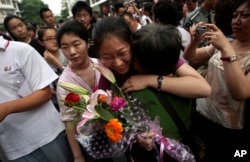Recent protests in China's Jiangsu and Hubei Provinces by parents of students in the local schools have led to questions and criticism of China's education system, and the measures the Chinese government is taking to make it more equitable.
The demonstrations erupted after China’s government announced it would implement a quota system where nearly 80,000 places at universities in Jiangsu and Hubei provinces would go to students from poorer regions in China. Until now, admission to universities in China has been mostly dictated by scores on the gaokao, or a national aptitude test. A greater proportion of spaces at China’s most prestigious universities in the eastern provinces are usually given to local students.
Seeking equal opportunities
Jiang Xueqin, a researcher and education consultant in China, said as China’s government strives to create more equal opportunity for superior education, its attempts at reform will likely be met with protest.
Jiang said, “It’s the middle class who will stand to lose, and they understand that, because the gaokao has benefited the middle class mostly, and with any changes to the Chinese system, the middle class will lose. So for the next few years as the government system changes, the middle class will become more and more anxious.”
Parents staged demonstrations in six cities in Jiangsu, as well as the cities of Wuhan, Xizhou, Yancheng, Taizhou, Changshu and Lianyungang. In Jiangsu, protesters at one point stood outside government offices, demanding authorities meet with them.
Quota system
The proposed quota system would allow for 210,000 students from poor provinces in China the opportunity to study at universities in 14 developed provinces and cities like Beijing and Shanghai. Beijing is home to China’s two most prestigious universities: Peking University and Tsinghua University.
Victor Yuan, chairman of Horizon Research Consultancy, says the proportion of students who obtain a university education in China’s Eastern cities is vastly different from those who do in the countryside.
Yuan said, “If you are in Beijing, that’s about 70 percent of students if they graduated from high school, could go to university, but if you are in a province maybe only 20 or 30 percent. That is the key problem.”
As China’s economy slows, pressure to get into China’s top universities, and secure a well-paying job afterwards, has increased. In response to the demonstrations, Jiangsu’s provincial government released a statement saying admissions at universities would ultimately increase because there are fewer applicants now than in the past.
Gap between rich and poor
The statement did little to calm concerned parents, nor did it reveal how the government will plan future educational reforms that address China’s gap between rich and poor. Eric Sun is a high school senior in Beijing, and says the differences in educational opportunity are readily apparent among the teenagers he sees and socializes with in the city.
Sun said, “I think the educational opportunity, the people are very stratified here. The people with less money, less everything, tend to have a harder time getting education. In order to get into the very prestigious schools, you have to have a lot of investment in your child.”
Eric plans to opt out of higher education in China altogether and attend college in the U.S. or Europe. Thousands of his peers throughout China will not have that chance, and be forced to enter the grueling competition of China’s education system and job market.





